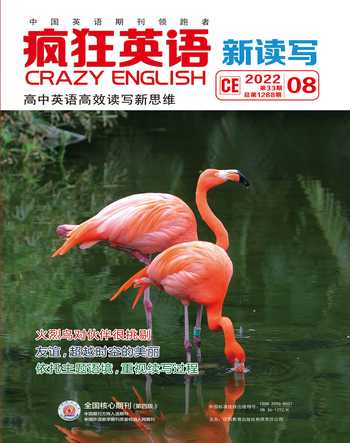Right moves 正确的行动
撒栋
幫助大卫的经历让“我们”建立了深厚的友谊。无论是施助者,还是被助者,友谊让“我们”紧紧相连。
1 Many years ago, when I was working as a psy-chologist at a children,s institution, a boy showed upin the waiting room. He was walking up and down rest-lessly.
2I showed him into my office and learned that hisname was David. He had lost his father as an infant,and had lived together with his mother and grandfa-ther since. But the year before David turned13, his grandfather died and his mother was killed in a car accident. Now he was14 and in Family Care. His face was pale, and he stared at his feet with his hands trembling all the time.
3I looked at David. How could I help him?“Perhaps he simply needs someone to share his pain with, ”I thought.“Perhaps he senses that I respect his suffering. ”So I de-cided that I,d be with him as long as possible.
4One afternoon in late winter, David took off his rain coat and put it on the back of the chair. While he was setting up the chess pieces, his face seemed more alive and his mo- tions more lively.
5 Several months later, the lilacs (丁香花) began to blossom outside. The air was fra-grant with scents from the lilacs. I sat staring at David ,s head, while he was bent over the chessboard. I thought about how little we know about therapy—about the mysterious pro- cess associated with healing. Suddenly, he looked up at me.“It,s your turn, ”he said.
6After that day, David started talking. He made friends in school and joined a bicycle club. He wrote to me a few times, telling me how he would try to get into university. Aftersome time, the letters stopped. Now, he had really started to live his own life.
7 Maybe I gave David something. At least I learned a lot from him. I understood how time makes it possible to overcome what seems to be an insuperable pain. I learned to be there for people who need me. And David showed me how one, without any words, can reach out to another person. All it takes is a hug, a shoulder to cry on, a friendly touch, a sympa-thetic nature and an ear that listens. Whatever it is, the friendship between David and me stays permanently.
1. How did David feel when he first met me in my office?
A. Excited. B. Nervous.C. Delighted.D. Depressed.
2. What was my way to relieve David,s pain according to paragraph 3?
A. Offering him help.B. Giving him some advice.
C. Keeping him company. D. Sending him inspiration.
3. Why does the author mention the lilacs, blooming in paragraph 5?
A. To describe a beautiful scene.
B. To present the changing season.
C. To express the author,s happy mood.
D. To indicate some change to happen to David.
4. What does the last paragraph mainly talk about?
A. The true meaning of friendship.
B. The best cure for a friend,s suffering.
C. The influence from the author on David.
D. The author,s reflection on his friendship with David.
Ⅰ. Sentences for writing
1. While he was setting up the chess pieces, his face seemed more alive and his mo - tions more lively. 当他在摆棋子的时候,他的脸看起来更有活力了,他的動作也更活 泼了。
【句式提取】while 引导的时间状语从句强调同时性或某时间段内一种情况发生 时另一种情况出现,与延续性动词连用。
【句式仿写】讨论还在进行时,乔治走了进来。
2. I understood how time makes it possible to overcome what seems to be an insuper- able pain. 我明白了时间是如何让我们克服一种似乎无法克服的痛苦变得可能。
【句式提取】make it possible/impossible/necessary/important/easy/difficult to do... 意 为“使做……变得可能/不可能/有必要/重要/容易/困难”。
【句式仿写】尽可能多地阅读英语文学,让稳定提高你的读后续写变得可能。
Ⅱ. Text-centered chunks
show up 露面;出现
stare at 凝视;盯着看
take off 起飞;脱下
look up 抬头往上看
at least 至少
reach out to sb 愿意提供援助;对某人感兴趣

